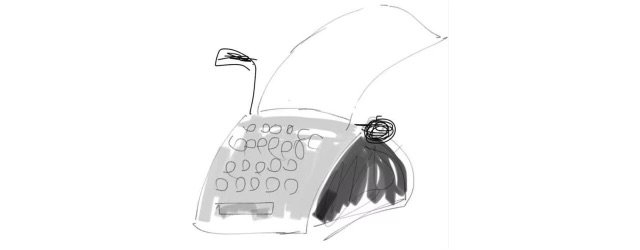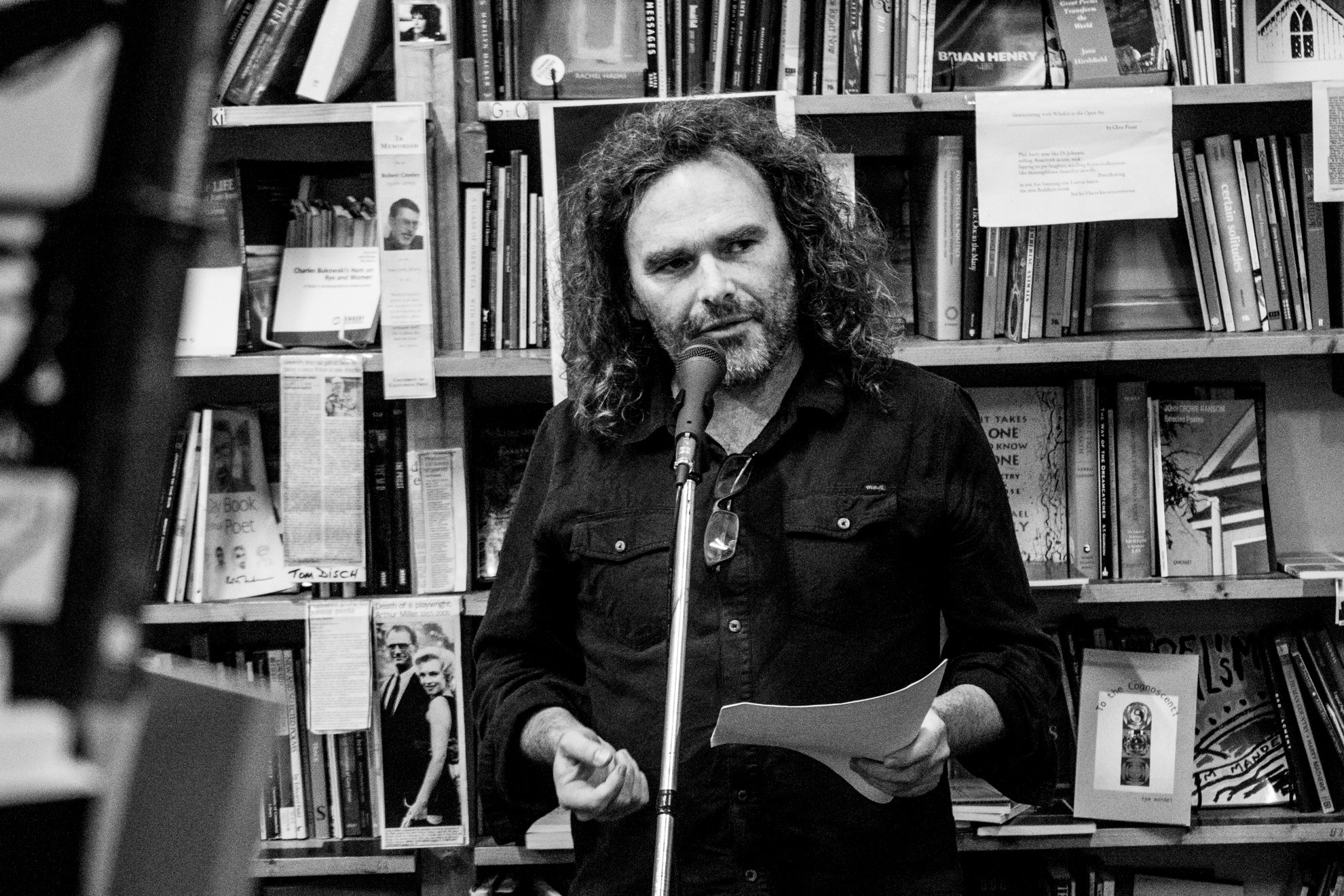Melbourne Poet's Union international poetry prize
Delivering the judge’s report for the 2018 MPU international poetry prize at Collected Works, November 30, 2018. PHOTO BRENDAN BONSACK.
Collected Works, Melbourne’s great poetry bookshop and crossroad, closed its doors to the public on November 30, 2018. It was and is and shall remain an enormous loss to literary Melbourne. The last event at the shop was the announcement of the winners of the 2018 MPU international poetry prize—and I was the judge.
When I got up to make my report I thanked Kris Hemensley for showing the way into the poetry scene for so many poets (myself included). Then I gave my report.
This is the report.
I have three sisters and a brother. My brother is the eldest.
When my brother was born our Mum thought he was the most beautiful baby in the whole wide world. Mum was so keen to share this fact with the world she entered her first-born in a baby contest.
Needless to say, my brother didn’t win. Didn’t even place.
The point I’m making is this: poems are poet’s babies. We give them life. We love them. Then we send them out into the world to be clubbed like seals. In other words, all the poems we write are beautiful, warm blooded and doomed.
All of which is a roundabout way of saying that to be the judge of a poetry prize is to be a clubber of seals. You have to sort through all those warm-blooded lovelies, then – one by one – cull them until a baker’s dozen remains.
For this year’s prize the job was particularly bloody because the crop was strong. And, yes, the poems that survived are gorgeous, but no more so than many that were left out on the ice.
Here’s how I went about my bloody business. I had a pile of poems, and I read that pile from top to bottom – marking each poem with a tick, a cross or a question mark. Then I set the pile aside for a week for seasoning. After a week I read the pile of poems again – but this time from bottom to top – marking them again with ticks, crosses and question marks. Then I went through the pile again and came up with a long list of 36 poems. Some of those poems had ticks, some had crosses, some had question marks – so my sorting mechanism was useless. Then I went through the long list and came up with a shortlist of 16 poems. Then I went through the shortlist and came up with a final list of 13 poems.
What was I looking for? I wasn’t looking. I was seeking. Seeking the feeling I get when I connect with, as Williams Carlos Williams put it, that “small (or large) machine made of words” that is a poem. For me, that feeling is a vibration. It makes me feel like a tuning fork.
All of the poems that I choose gave me that feeling – as did a score of others that didn’t make the cut. Here’s a cut-and-paste poem, made from lines of the winning poems, to try and show you what I mean.
Gloved and masked, he goes in through an incision in my navel
The moon an aching / breast, half-breathing / half-broken
There’s something about the way / flaws in the fence intensify the light
We glows in dawn’s red hole
In the tree between wide-spaced branches / an orb-weaver has spun concentric circles on silken radii as strong as steel
The birds go, / leaving their claw prints in the silt. / A language / secret as subterranean vaults.
The rain upends the ocean over itself
Let the sea breed its wreckage
I thought I could build bridges / back to anything, anywhere. Anyone.
And why is it that men and women walk upright.
Like the insects he has an instinct, a yearning for pattern.
Up in the saddle he splits a tree in the background in / half, so it appears that he’s sprouting wings of leaves / from his back; a horseman of the casual apocalypse.
I look back, see what I have left behind / the imprint of my loneliness in the sand.
Now, let me work my way through the list of winning poems, starting with the Martin Downey Urban Realist Award.
The winner was “The Hours Alone” – by Rob Wallis.
I loved the evocative sense of space and time that this poem created. It was as spare and strung out as a long, hot summer – and barbed with lines like …
He produces oil, rubs my burning shoulders,
massages a message into my back.
Then there are the six commended works, all of which are more than commendable.
Cathy Altmann’s “Crochet and Crying”.
A quietly disturbing poem – and I mean that as a complement. This poem was one that I felt compelled to read and reread.
Brett Dionysius’s “26thJanuary – 6thFebruary, 1788”.
This is a poem with a very strong bass line – reminding me of the debauched first night of European occupation as told in The Fatal Shore.
Roger Higgins’s “Facing the Sky”.
A distracted and distracting poem: a post-pastoral that read as though it was tapped out on an iPhone. Almost like a William Wordsworth for our age of digital disruption.
Andy Jackson’s “Aesthetic Surgery”.
A powerful poem of identity: a vivisection of the insecurity and objectification that nags away at our selfie generation.
Damen O’Brien’s “Windward”.
A poem that can be as simple or as complex as the reader wishes. It glides along, but is packed with thought, image and feeling.
And Rhonda Poholke’s “Drought Lines”.
I grew up in the country and moved to the city in the middle of a drought. Reading this poem brought it all back to me – and then some. This work is a master-class in the possibilities of close observation and acute description.
Next come the three highly-commended poems.
Gayelene Carbis’s “The Dead Sea”.
In a word, fabulous. The poem doesn’t show off. It’s a study of accumulation and restraint – accumulating details and images, withholding emotion – that drew me closer with each reading.
Ross Gillett’s “Ascending from the Wreck”.
What should I tell you about this poem? I should confess that I dreamt about it. That’s how powerful I found its imagery.
And Dean Gessie’s “historylesson[sic]”.
Smart and sharp: a percussive, propulsive poem that reads like an alternative history of the European invasion of Australia.
Finally, there are the third, second and first prize getters.
Third prize went to “Genetics” by Philip Neilson.
I find it hard to describe this poem because every time I read it I find something new. It’s a poem with multiple dimensions – and multiple surprises – much like the human genome.
Second prize went to “Paling Fence” by Ross Gillett.
Simple and profound: this poem stunned me when I first read it. I love how it finds the eternal by focusing on everyday objects. And, yes, it reminded me of Patrick Kavanagh’s sublime “Old Wooden Gate”.
And first prize – the Leon Shann Award – went to “My Father on a Horse, Date Unknown” by Brett Dionysius.
I always thought that Conrad’s Heart of Darknesswas the longest short novel I ever read. This poem is one of the longest short poems I’ve ever read. The first time read it I thought, “This poem should be a novel.” Then I read it again and thought, “No, it’s too perfect to be a novel.”
In conclusion, I have to apologise.
As a judge, I know I failed. You see, there was just one of me, and hundreds of wonderful poems – and consequently, I couldn’t catch everything. I know I missed good poems – and I’m sorry for that – but I am grateful for the poems that I did catch.
With that in mind, I want to thank each and every poet who entered this year’s prize. It was a privilege to read your work.

